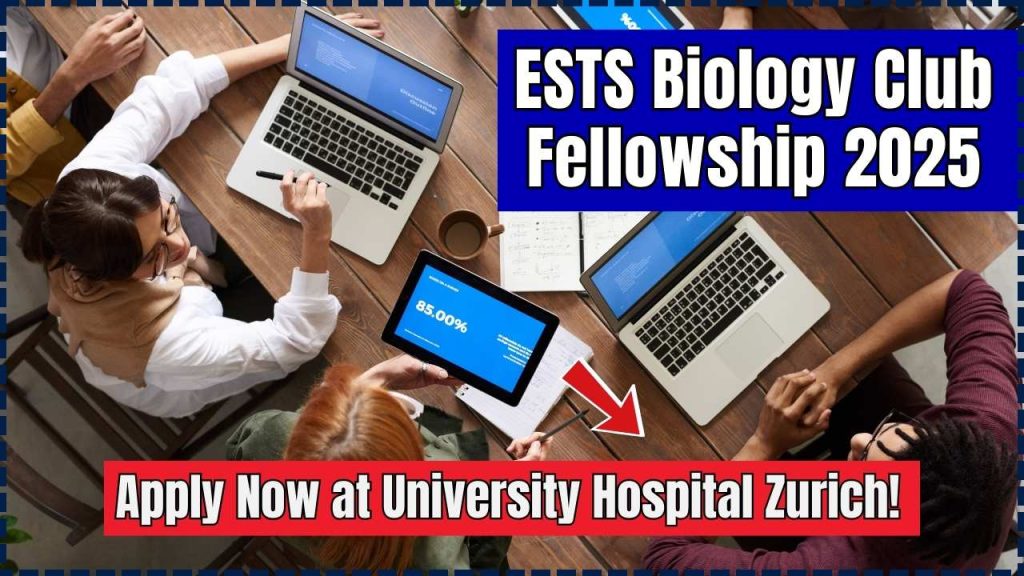ESTS Biology Club Fellowship 2025: The ESTS Biology Club Fellowship 2025 at the University Hospital Zurich is now accepting applications — and if you’re a young thoracic surgeon eager to dive into the world of robotic-assisted thoracic surgery, this could be a game-changing opportunity.

Offered by the European Society of Thoracic Surgeons (ESTS) in partnership with the prestigious University Hospital Zurich, this three-month fellowship merges clinical observation, robotic training, and research participation. Fellows work alongside leading surgeons, tapping into one of the most advanced robotic surgery programs in Europe.
Whether you’re just entering the thoracic field or seeking a cutting-edge specialization, this program is tailored to transform your career and skills.
ESTS Biology Club Fellowship 2025
| Feature | Details |
|---|---|
| Fellowship Name | ESTS Biology Club Fellowship 2025 |
| Offered By | European Society of Thoracic Surgeons (ESTS) & University Hospital Zurich |
| Location | University Hospital Zurich, Switzerland |
| Fellowship Type | Robotic-Assisted Thoracic Surgery (Research + Clinical Observation) |
| Duration | 3 Months |
| Grant Amount | CHF 18,000 (includes salary, travel reimbursement, and project costs) |
| Eligibility | M.D. postdoc in thoracic surgery; under age 40; ESTS member; proficient in English or German |
| Application Deadline | April 1, 2025 |
| Official Website | Visit ESTS Fellowship Page |
The ESTS Biology Club Fellowship 2025 is more than a training program — it’s an investment in your future, your patients, and the global thoracic surgery community. With a generous grant, world-class mentorship, and access to the latest robotic technology, this program is your chance to join the next generation of surgical innovators.
What Is the ESTS Biology Club Fellowship?
This exclusive program supports promising thoracic surgeons who are eager to engage in robotic surgical research and clinical practice. Hosted by the University Hospital Zurich, the fellowship offers:
- Observation of robotic thoracic surgeries using the da Vinci Surgical System.
- Participation in a research project based on the ESTS Robotic Surgery Database.
- Mentorship by leading European thoracic surgeons.
Fellows leave with hands-on insights, academic output, and clinical experience that can reshape their surgical approach and career path.
Why Robotic Surgery Matters in 2025
According to a 2023 report from the Journal of Thoracic Disease, robotic-assisted thoracic surgery:
- Reduces post-operative pain by up to 30%.
- Shortens hospital stays by 1.5–2 days on average.
- Leads to more accurate tumor resections.
Globally, robotic surgery adoption is growing, with over 7 million robotic procedures performed annually as of 2024, and the field is projected to reach $25 billion by 2028.
By joining this fellowship, surgeons step into the frontlines of innovation, positioning themselves for leadership roles in hospitals and research institutions.
How to Apply For ESTS Biology Club Fellowship 2025
Step 1: Prepare the Required Documents
You’ll need:
- Curriculum Vitae (CV) with full publication list.
- Research Proposal outlining your robotic surgery focus.
- Support Letter from your current institution, confirming its capability in robotic thoracic surgery.
Step 2: Check Eligibility
Ensure you meet all criteria:
- Postdoctoral M.D. in thoracic surgery.
- Under 40 years old.
- Proficiency in English or German.
- Current member of ESTS.
Step 3: Submit Your Application
Email all documents by April 1, 2025 to:
Zlatka Mitreva
Projects Administrator, ESTS
Email: zmitreva@kenes.com
Fellowship Grant Breakdown
The fellowship includes a CHF 18,000 grant, which covers:
- Three months’ salary.
- Travel to/from Zurich.
- Project-related expenses.
- 10% administrative overhead.
This generous support makes it accessible for international applicants, covering both academic and living costs.
Tips to Strengthen Your Application
Want to stand out? Here’s how:
- Craft a compelling research proposal: Address a current gap in robotic thoracic surgery.
- Show your institutional support: A strong letter from your hospital or department increases credibility.
- Demonstrate past research: Include relevant publications or abstracts.
- Be clear about your post-fellowship plan: Show how you’ll apply your new skills back home.
About University Hospital Zurich
A world leader in thoracic innovation, the University Hospital Zurich is renowned for:
- Advanced use of robotic-assisted surgical systems.
- A high-volume thoracic surgery department.
- Collaborative projects with global health institutions.
How This Fellowship Supports Global Healthcare
The ESTS Fellowship isn’t just a personal growth opportunity—it’s a contribution to global health. Fellows return to their home institutions equipped with:
- Advanced surgical techniques that elevate local patient care.
- Research expertise to lead academic programs.
- A commitment to medical knowledge exchange across borders.
Past Fellows Speak: Testimonials
“It was the most impactful three months of my training. Observing live robotic surgeries and contributing to a real database project gave me confidence and credibility in my hospital.”
— Dr. Eleni T., 2023 Fellow, Greece
“The research I conducted during the fellowship led to a conference presentation and a published paper. I couldn’t recommend it more.”
— Dr. Omar K., 2022 Fellow, Egypt
Career Benefits
- Enhanced CV for international academic and clinical roles.
- Eligibility for research publications and ESTS presentations.
- Increased confidence with robotic platforms, preparing you to lead or train others.
- Broadened professional network across Europe and beyond.
Edinburgh Futures Institute 2025/2026 Visiting Fellowship Now Available – Check Application Process
Fully Funded Curatorial Research in NYC? ESR Fellowship 2025 Now Open!
Dream Research Opportunity! Fully Funded COCOON Fellowship 2025 at ISMAT!
FAQs About ESTS Biology Club Fellowship 2025
Can I apply if I’m not yet an ESTS member?
Yes, but you must register for ESTS membership before the application deadline.
Will I perform surgeries?
No. The program involves clinical observation and research, not direct surgical procedures, due to Swiss licensing regulations.
Is housing included?
Housing is not provided, but the grant supports accommodation and living costs in Zurich.
Is the fellowship open to non-Europeans?
Yes! The program is open to both European and international applicants.
What happens after the fellowship?
Fellows are expected to return to their home institutions and apply their new skills, ideally in settings that offer robotic surgery.











